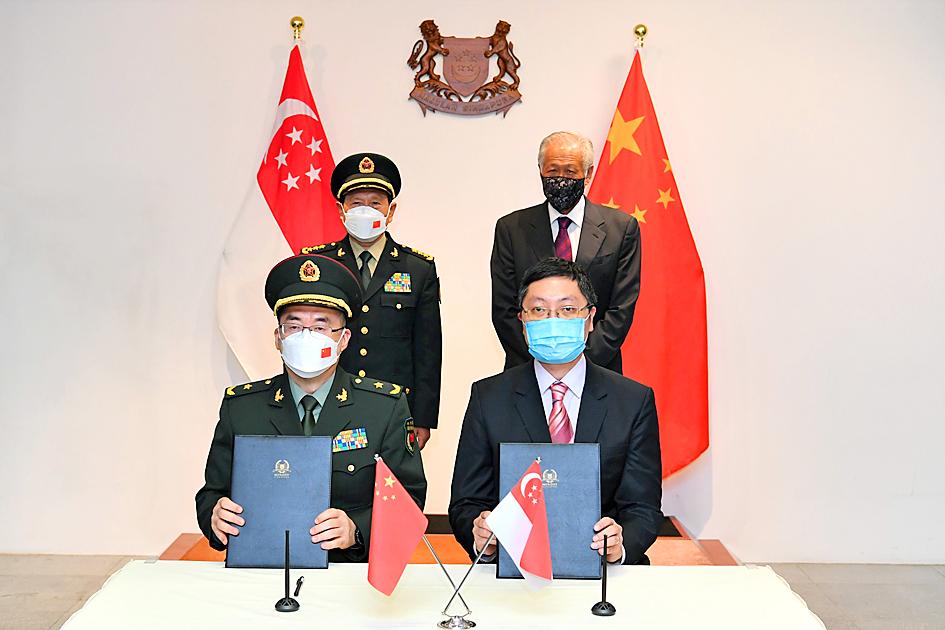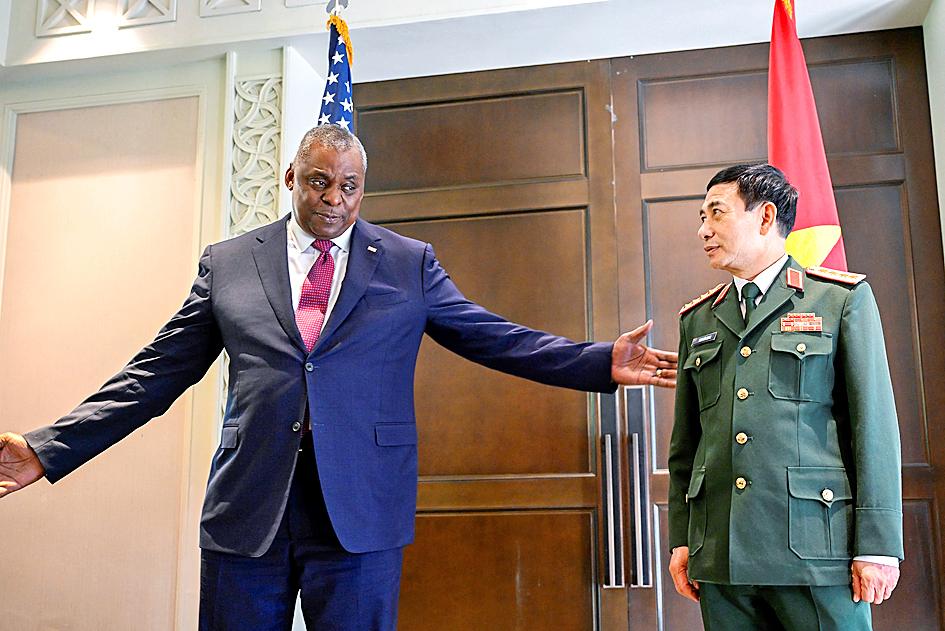Beijing would “not hesitate to start a war” if Taiwan declares independence, China’s defense minister warned his US counterpart in their first face-to-face talks, the Chinese Ministry of National Defense said yesterday.
“If anyone dares to split Taiwan from China, the Chinese army will definitely not hesitate to start a war no matter the cost,” it cited Chinese Minister of National Defense General Wei Fenghe (魏鳳和) as telling US Secretary of Defense Lloyd Austin on the sidelines of a summit in Singapore.
Beijing must “refrain from further destabilizing actions” on Taiwan, Austin said.

Photo: EPA-EFE
The US and China are expected to use the Shangri-La Dialogue, a major Asian security forum, to press their competing visions for regional stability, even as the war in Ukraine consumes Washington’s attention and Beijing struggles with economic pressures at home.
Austin and Wei are expected to deliver speeches at the event, which started late yesterday.
The US is seeking to use the three-day conference to push back against growing Chinese influence in the Asia-Pacific region, while also establishing guardrails to prevent competition from getting out of hand.

Photo: Reuters
Austin and Wei last spoke during a telephone call in April.
Japanese Prime Minister Fumio Kishida, a key US ally, was to give the opening event’s keynote speech.
He was expected to set out his views on expanding the US concept of a free and open Asia-Pacific region with an eye to the war on Ukraine and China’s military assertiveness.
Many nations attending have resisted pressure to take sides and have sought to avoid getting caught in the middle.
Singapore-based International Institute of Strategic Studies executive director James Crabtree said that while the focus is on the US and Chinese defense heads, as they are expected to meet on the sidelines of the conference, it remains unlikely that there would be any kind of breakthrough on new areas of cooperation between the two sides.
“You look during the Ukraine crisis — that has reinforced in the eyes of both the Americans and the Chinese that they’re not really acting in a way that is honest and forthright with each other,” he said in an interview with Bloomberg TV. “So part of the problem is it’s hard to see how you get better results out of that relationship.”
A flurry of bilateral talks between defense ministers have started ahead of the conference.
Austin and Singaporean Minister for Defence Ng Eng Hen (黃永宏) had one of the first bilateral discussions.
More than 30 defense ministers are in Singapore for the event.
Kishida, who had persuaded some traditional Southeast Asian partners of Russia to criticize its war in Ukraine, is expected to use his speech to bring others in Asia aboard.
Kishida has taken a tough stance on Russia’s attack on Ukraine and made frequent veiled warnings about the risk of a similar grab for territory by China.
A senior US defense official, who briefed reporters ahead of Austin’s arrival, said that the region has seen a clear trend toward self-isolating behavior by China.
Countries across the region are concerned by Beijing’s aggressive behavior, the official said, adding that the example of Ukraine looms large in the region, demonstrating the risks of disorder and spheres of influence.
The Pentagon is working to ensure that the meeting with Wei would be professional and substantive, the official said.
The US has no desire to create a public spectacle, the official said, referring to testy public exchanges between the US and China in the past few years.
The official said the US places a priority on improving crisis communications with Beijing.

A magnitude 5.6 earthquake struck off the coast of Yilan County at 12:37pm today, with clear shaking felt across much of northern Taiwan. There were no immediate reports of damage. The epicenter of the quake was 16.9km east-southeast of Yilan County Hall offshore at a depth of 66.8km, Central Weather Administration (CWA) data showed. The maximum intensity registered at a 4 in Yilan County’s Nanao Township (南澳) on Taiwan’s seven-tier scale. Other parts of Yilan, as well as certain areas of Hualien County, Taipei, New Taipei City, Taoyuan, Hsinchu County, Taichung and Miaoli County, recorded intensities of 3. Residents of Yilan County and Taipei received

Taiwan has secured another breakthrough in fruit exports, with jujubes, dragon fruit and lychees approved for shipment to the EU, the Ministry of Agriculture said yesterday. The Animal and Plant Health Inspection Agency on Thursday received formal notification of the approval from the EU, the ministry said, adding that the decision was expected to expand Taiwanese fruit producers’ access to high-end European markets. Taiwan exported 126 tonnes of lychees last year, valued at US$1.48 million, with Japan accounting for 102 tonnes. Other export destinations included New Zealand, Hong Kong, the US and Australia, ministry data showed. Jujube exports totaled 103 tonnes, valued at

BIG SPENDERS: Foreign investors bought the most Taiwan equities since 2005, signaling confidence that an AI boom would continue to benefit chipmakers Taiwan Semiconductor Manufacturing Co’s (TSMC, 台積電) market capitalization swelled to US$2 trillion for the first time following a 4.25 percent rally in its American depositary receipts (ADR) overnight, putting the world’s biggest contract chipmaker sixth on the list of the world’s biggest companies by market capitalization, just behind Amazon.com Inc. The site CompaniesMarketcap.com ranked TSMC ahead of Saudi Aramco and Meta Platforms Inc. The Taiwanese company’s ADRs on Tuesday surged to US$385.75 on the New York Stock Exchange, as strong demand for artificial intelligence (AI) applications led to chip supply constraints and boost revenue growth to record-breaking levels. Each TSMC ADR represents

TRUST: The KMT said it respected the US’ timing and considerations, and hoped it would continue to honor its commitments to helping Taiwan bolster its defenses and deterrence US President Donald Trump is delaying a multibillion-dollar arms sale to Taiwan to ensure his visit to Beijing is successful, a New York Times report said. The weapons sales package has stalled in the US Department of State, the report said, citing US officials it did not identify. The White House has told agencies not to push forward ahead of Trump’s meeting with Chinese President Xi Jinping (習近平), it said. The two last month held a phone call to discuss trade and geopolitical flashpoints ahead of the summit. Xi raised the Taiwan issue and urged the US to handle arms sales to